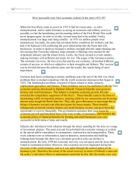Nazi war production in the years 1939-45 was essentially inefficient. How far do you agree with this view?
UNIT 9
‘Nazi war production in the years 1939-45 was essentially inefficient.’ How far do you agree with this view? (30) (June 2014 Paper)-
Arguably the biggest downfall behind the German defeat in the Second World War was the failure to create an efficient wartime economy and production process. Without the strong implementation of these basic factors it was always going to be a near impossibility to be successful in a total war, especially given the fact the Allies had much greater military outputs. Nazi war production in the years 1939-45 was essentially inefficient due to the lack of raw materials and the shortage of labour; however, the organisational structure of the regime also had an impact on efficiency.
The factor that, more than any other, shaped Nazi war aims and plans was Germany’s lack of natural resources, iron, coal, oil and other materials, that it needed for a sustained war effort. Perhaps above all else it lacked reserves of high-quality iron ore. The attempt to compensate for this led to attempts at the huge Reichswerke Hermann Göring to develop the production of low-grade ore for manufacturing purposes. Yet, this could never meet the demands of the expanding military needs, thereby making Germany in part dependent on imports, in particular from Sweden; during the war, the amount of ore imported from Sweden remained constant at approximately 5.4 million tons a year. However, the annexations of Austria, Bohemia, Poland and Alsace-Lorraine by 1940 brought with them huge quantities of high-quality iron ore; in 1943 these areas alone produced 6.7 million tons for the Nazi war effort. The supplies of iron ore to the German war economy increased from 13.4 million to 20.2 million tons between 1940 and 1943. Other areas of conquered Europe yielded raw materials that were vital for the war effort also: manganese from the Soviet Union; nickel from Norway; bauxite from France.
Although the invasion of the Soviet Union had ideological causes, the destruction of Bolshevism being a central theme in Mein Kampf, there were also very strong economic considerations, not least the desire to control the oil fields in Caucasus. It is believed that if Germany succeeded in capturing the Caucasus oil fields then they could gain 75 per cent of the materials feeding the Soviet war effort. This projection gave Hitler the reason he had been looking for to initiate the battle and served only as encouragement for the rest of the Nazi Party and the German people. Germany was in dire need of oil by 1941, the German arms would very soon grind to a halt without the necessary supplies; this problem needed an imminent solution. The German-Soviet Non-Aggression Pact signed in 1939 meant that Hitler did not have to worry about a war on two fronts and the Soviets would still trade oil with Germany. Unfortunately, these supplies were not sufficient to keep Germany going through the War at the rate they were being consumed. This said, the invasion of Russia and the take over of the Caucasus oil fields was not the only option presented to Hitler, some of the largest oil fields in the world were located in Saudi Arabia, Iran and Iraq. When the Italian dictator, Mussolini, led a conquest of Greece, Hitler could have used this as a springboard for further adventures into the Middle East. If he had taken the same number of divisions he had used to invade the Soviet Union and had advanced instead into Syria or Turkey and then on into Iraq, he might have captured the petroleum facilities with little difficulty. On the other hand, this would have meant Hitler would have been required to put aside his dreams of the convenient Lebensraum and focus solely on the necessity of oil rather than more expansionist ideas; something Hitler was unlikely to give up. Overall, the failure of the Nazis to fully exploit the raw materials of the countries they occupied and Hitler’s poor prioritisation of ideological goals and necessities was crucial in preventing the expansion of the German economy necessary to fight a major war.









